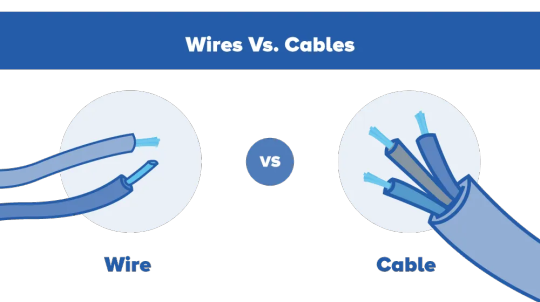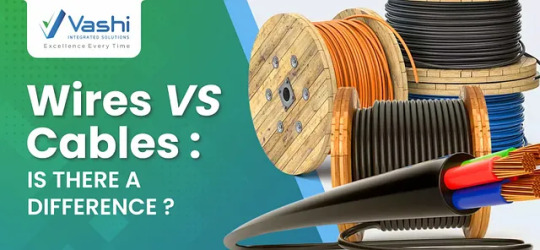#WireCableGuide
Explore tagged Tumblr posts
Text
What is the difference between Wires and Cables?

In our daily lives, we depends on electricity more than we realize, and wires and cables are two important components of this energy chain. Although they are frequently combined, they actually serve different purposes. Consider wires as the individual channels carrying electricity, like a straight path on a little road. On the other hand, cables function as expansive highways that combine several pathways, enabling a more effective power flow. Understanding how wires and cables work is important for anyone. So, let’s explore the difference between these two vital components!
youtube
What Are Wires?
Wires are the basic building blocks of electrical systems. Made from conductive materials like copper or aluminum, they are designed to carry electrical current. Wires can be solid or stranded; solid wires consist of a single piece of metal, while stranded wires are made up of many small strands twisted together. This design allows stranded wires to be more flexible, making them ideal for applications where movement is necessary.
Common Uses of Wires
Household Wiring: Wires are used in the electrical systems of homes, connecting outlets, switches, and appliances.
Electronics: Inside our gadgets — like phones, computers, and televisions — wires connect various components, allowing them to function together.
Automotive: Wires are crucial in vehicles, powering everything from headlights to the engine.

What Are Cables?
Cables are essentially groups of wires bundled together, often with additional layers of insulation for protection. This design not only helps with organization but also enhances safety and efficiency. Cables can come in various types, depending on their intended use.
Common Types of Cables
Power Cables: These are designed to carry electricity over long distances, often used in electrical grids and industrial settings.
Data Cables: Cables like Ethernet and USB are essential for transmitting data between devices, enabling internet connectivity and file transfers.
Coaxial Cables: Often used for cable television and internet, these cables help transmit signals over longer distances without interference.
Why the Difference Matters
Understanding the distinction between wires and cables is more than just technical jargon; it has real-world implications. Here are a few reasons why this knowledge is important:
Safety: Using the right type of wire or cable for a specific application ensures safety and reduces the risk of electrical hazards. For example, using a cable designed for outdoor use prevents damage from weather conditions.
Efficiency: Knowing when to use wires versus cables can help optimize performance. For instance, a cable with multiple wires can handle more current, making it suitable for high-power applications.
Compatibility: Different devices and systems require specific types of wires or cables. Understanding these differences helps in selecting the right components for repairs or installations, ensuring everything works seamlessly.
Cost-Effectiveness: Using the right materials can lead to cost savings in both installation and maintenance. For example, high-quality cables can reduce energy loss, saving money on electricity bills in the long run.
Conclusion
Although wires and cables serve similar functions in electrical and communication systems, it is crucial to understand their distinctions in structure and application when choosing appropriate materials. Wires are best for basic setups, while cables, consisting of multiple insulated wires, are better suited for complex applications that need more flexibility and protection. For a comprehensive selection of wires and cables and a better understanding, I welcome you to check out Vashi Integrated Solutions Limited, where we provide a diverse selection of top-notch electrical products customized for your requirements.

Read more about different types of Wires and Cables : https://www.tumblr.com/vashiislblog/763479115947016192/different-types-of-wires-cables?source=share
#WiresVsCables#ElectricalWiring#CableTypes#PowerCables#ElectricalKnowledge#WireCableDifferences#ElectricalBasics#WireCableGuide#TypesOfCables#ElectricalSafety
1 note
·
View note